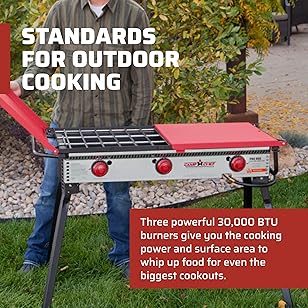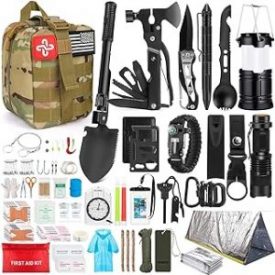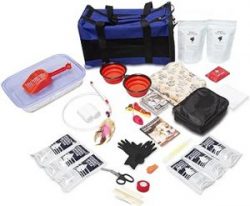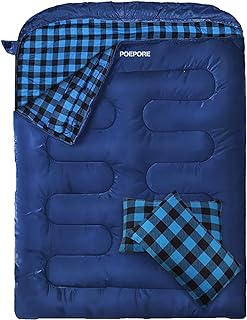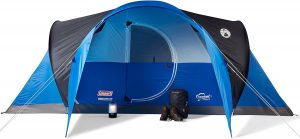Wilderness Survival
 How To Survive In The Wilderness
How To Survive In The Wilderness
There are many ways one might find themselves alone or with others in a wilderness survival situation from auto or airplane accident to forced out by terror and warfare.
From the beginning of time man has survived on his own knowledge and skills passed down from one generation to the next. Were you paying attention? Whether it is constructing a shelter, gathering food, or preparing for war, man has continually progressed with technology in every way possible. In even poorer countries we can live in nice homes filled with flat screen TVs, iPods, electric tea pots and other gadgets that we have become spoiled by. We have supermarkets, restaurants and vendor carts; making it convenient to grab a bite to eat. Today, many of our wars are fought with radar guided rockets from miles away with equipment you thought only existed in Star Wars.
But, have you ever stopped to think what would happen tomorrow if all of that was gone? If an EM Pulse wiped it all away? Would you be able to survive? Would you know what to do? Would you know what to be aware of and what to look out for? Could you start a fire, create shelter, and find or hunt food, know not to walk a ridge line or train tracks? Are you prepared for the unexpected?
The sad truth is that many people are not remotely prepared. The great news is I am going to teach you somethings you need to know and do in order to survive the wild outdoors. Another wonderful benefit to this vital report is the skills taught can be used in many other ways in the event of natural disasters, a pandemic, riots, and even the coming “Zombie Apocalypse”!
I can’t stress enough how important it is to know how to survive on your own. As I said before, our society has become so dependent on technology that many of us couldn’t find north if someone had a gun to our head. Many would say, “I can find it with my iphone ipad Smartphone” Good luck when radars and satellites are down or you’re out of juice with that thing in the middle of nowhere!
I’m going to take you to bare basics and show you how to survive and protect you and your family. I will give you the knowledge on how to sharpen your instinct and how to make fast, smart decisions in hectic times. Let’s face it; these are things we don’t normally think about or talk about, which is why you and your family need to be aware! Being prepared for the “worst case scenario” is the least we can all do to try and survive whatever element life throws at us. As I have always said, no one plans on getting lost in the woods while taking an enjoyable hike! No one plans on taking a 10ft plunge off a boulder, breaking their leg in the wilderness! And no one plans on spending the night in the woods without shelter or food. What would you do?
Well grab some paper and a pen and start taking notes so you can lay out a survival plan to help you and your family through all the “worst case scenarios”! Let’s get started!
Survival Equipment
It doesn’t matter if you’re taking the family on a camping trip for the weekend, or if you’re going on the hunting trip you’ve been planning for months, there are certain things you need to have in order to be prepared for the worst. Below I am going to cover the most critical things you should have in your possession in the event you become lost in the wilderness. Conquering nature is not possible, but adapting to it and surviving it is!
Here is a list of items you will need in your survival pack. If you don’t have these items handy in a backpack you should acquire them immediately for the future and always keep your bag in an easy-to-access part of your home, or on you in the event you go out into the wilderness.
Water- This is the most important item to have with you. It is crucial to keep yourself hydrated. You don’t know how long you could be without a good supply of water, so use it sparingly. I recommend carrying a plastic canteen.
Water Purification Tablets- Water purifying tablets are a handy item to have in the event you run out of water. You should find a water source that is running. NEVER drink water that is still. Water that is still can be stagnated and have some very nasty bacteria; causing you to have severe diarrhea and vomiting which will lead to dehydration.
Roll of Cord- I recommend taking a roll of string. 1/8 inch nylon string works well. This can be used to tie limbs together to make a shelter, for tying sharp objects to sticks for a makeshift weapon, and for setting hunting traps. There are several other ways the string will come in handy as you are in the woods.
Bic Lighters- I carry 2 Bic lighters with me in a waterproof bag such as GLAD in the event they get wet. The reason I say Bic is because if they become wet, they will dry out quickly and be back in working order in no time. They are also one of the most reliable lighters for the price. The ones for lighting pipes that use a stronger longer flame are good for rugged conditions.
Waterproof Matches- I would also have a box of waterproof matches. You never know, you may need them too.
Flint Rock- Okay, I know we are going overboard with fire, but take it from me, you do not want to spend the night in woods without a fire and certainly if it’s cold and raining. What if you lost your bag of lighters and your waterproof matches suck and won’t work properly? You can never be too prepared.
Compass- Of course you need a compass. Don’t just go buy one and throw it in the bag either. Learn how to use it. I also advise you don’t purchase a cheap one. This is one of your lifelines we are talking about here!
Small Coffee Can- I take along a small can that has 2 drilled holes at the top. I run a wire through the holes for a handle and make a hook so that it can be hung over a fire. You can also take a small pot, but the can cuts down on baggage. This is great for boiling water or warming food if you don’t have a pot.
First Aid Kit- This is valuable to have if you get injured. This kit provides everything to aid to most common wounds. Sorry, they don’t include a serum for a zombie bite yet!
Whistle- A whistle is a great way to attract a search party.
Ball of Red or Orange Yarn- There won’t be any crocheting, this will be used for markers to help you identify areas of your surroundings and for search parties to find you. Just cutting off a 12 inch piece and tying it to a tree limb where it’s easily visible will do the trick.
Flashlights- I would suggest 2 LED flashlights and back up batteries just in case. You will thank yourself 1,000 times over at night or investigating a cave for shelter and it will also help search parties find you at night.
Hand Sanitizer- This is good to have on hand after cleaning fish or field dressing an animal and keeping down on the chance of you getting an infection and becoming ill.
Identification- It’s always a good idea to have identification on you. Who knows, you could hit your head and forget who you are!
3ft Long Steel Rebar- This is great to have with you! I find two sticks shaped like a “Y”. Simply stick them in the ground on the outsides of the fire and place to metal rebar in the “Y’s”. Now you can hang your can or pot over the fire.
Small Tarp and Emergency Blanket- The blanket will help keep you warm and the tarp can be used for a roof or walls for a makeshift shelter. Just roll them up and tie them to the bottom of your pack.
Fishing Line, Hooks, and Bobbers- You will need to find a water source and begin fishing too. I suggest you just go buy and entire roll of 8 pound test line and some hooks. It wouldn’t hurt to grab a few small bobbers. This is great to hand with you and it doesn’t take up much room. You can grab some lures, but there will be plenty of bait in the woods.
Extra Socks and Gloves- It would be wise to take an extra pair of socks and gloves. You never know when your original pair may become wet. Wet socks in the cold sucks, and you could come down with a cold. This is not what you need in the wilderness. You need to take every step to protect yourself from sickness and infections. It would be a good idea to carry a toboggan also to keep your head warm from cold elements.
Kitchen Trash Bag- This can be used to transport large amounts of water.
Notepad/Journal and a Pen- I keep a notepad with me just to jot down notes about my surroundings and I can also leave notes on trees in the woods to help search parties find me.
Small Cans of Food/Trail Mix- It wouldn’t hurt to have a bag of trail mix to snack on and a couple of cans of food with peel back tabs on them. Grab a spoon while you’re at it.
Rainproof Poncho- You can buy these for little to nothing and they are great to have when mother nature comes raining down on you.
Survival Knife- I always carry my survival knife with me in the woods. It’s very sharp for sharpen sticks for a trap or a make shift weapon, great for field dressing game and cleaning fish, has plenty of tools inside, and it includes my compass.
Multi Tool- I think the name says it all. Get one; there are a number of things it will come in handy for.
Wire Saw- This is great to have and doesn’t cost much at all. After starting a good hot fire you can even burn green wood. The wire saw is compact, and makes quick work of a 3 or 4 inch branch. It also is a lifesaver when cutting wood to make a shelter.
Small Hatchet- This is good for cutting branches and splitting short, large logs by driving the hatchet into the top end of the log and taking another available log to hammer the hatchet through. It can be worn on a belt just like your machete.
Machete- This is a great tool to have on hand. Not only can this be used to defend you, but this is great for chopping down saplings and removing excess brush.
If You Have a Gun, Carry Plenty of Ammo- I think you can figure out this is valuable to have for hunting for food in case you run out on what little you brought with you. This could really mean the difference in eating and having energy, or starving to death.
Small Can of Lighter Fluid- This is great for getting a fire started the easy way.
For Luxury Only, A Roll of Toilet Paper- Your rear end will thank you…well until you run out…then it time to gather leaves!
Okay, so I think we covered all the general and necessary items you need to have in your pack. Don’t worry, I know it seems like a lot, but it’s not and it will all fit into a basic field backpack. (Excluding the rod, this will stick out the top of the pack) I know some of you may be thinking some of these items are not necessary to have, but I beg to differ. Everything I have listed above is the exact list I have in my pack and you should too. The first time you are lost, scared, and confused, and you reach in your pack for something you need and you don’t have it because you thought “you wouldn’t NEED it” you will be irate with yourself, guaranteed.
Keep in mind a 72 hour bug out bag is different from your pack as is your russack. All depends on how you want to carry your goods.
When it comes to your pack I would suggest you find one with a waist strap for added support for your back. What you will be carrying won’t weigh a ton, but after a while you will be glad you spend the extra money for a good pack.
You should purchase a good pair of high top hiking shoes for inside the insulated boots to give support to your ankles in rough terrain and for warmth.
As for what you’re wearing never go out in the wilderness without adequate clothing. Don’t wear a short sleeve shirt and a coat for an Eskimo! Dress in layers! This is very important. If you start to sweat your clothes will become wet and you could get a cold and you are also dehydrating your body.
Now that we have covered what you need to have with you let’s start getting into some skills you need if you want to survive the wilderness alone.
Survival Skills
In this section of the report we will be covering the most important part of this subject, survival. Survival in the wilderness takes wits, patience, planning, and a clear mind. The moment you panic and react without thinking could have devastating results in the end. You must have a plan and execute it, and only change that plan if you have thought through what the benefits are and what the disadvantages are. For instance, if your plan is to follow a path you have found and all of the sudden you see a road from course to a different path may lead you back to where you started. So, as you can see…THINK THINGS THROUGH.
So now let’s get down to the nitty-gritty…
Suppose you are out hunting or hiking. It’s in the afternoon and you’ve ventured out further than you normally do to explode the unknown wilderness. As you decide to head back to your vehicle you suddenly realize you don’t know how to get back to familiar grounds. Now, at this point many people immediately just start walking and saying, “Surely I’m not lost, I will find my way back.” It’s just something in our heads that cause us to walk at this moment and start making stupid decisions. I think its pure urgency and the fact of not wanting to accept that this has happened.
At the moment you feel like you are lost you need to follow these simple steps…
S.T.O.P. = Stop, Think, Observe, and Prepare.
Many times just sitting for a few minutes and thinking about what you did and where you went will end this nightmare before it starts. However, you never know that fact so you need to open your pack and take out your red/orange yarn. Cut off a 12inch piece and tie it to an easily visible tree. This is your first marker indicating your first known lost zone. It would also be wise to take out your notepad and write, “My name is blah blah, and today’s date and time is…this is where I realized I was lost. This could really help search parties and increase your chances of being found. It will also help you if you are trying to find your way out and you happen to walk in a big circle like so many lost wanders do.
Start walking in the direction you came from, but if after only a few minutes things are still unfamiliar, turn around and go back to the spot you were at. It’s late in the afternoon so sorry, you aren’t going anywhere. Many people tend to wander until dark and then realize they are cold and have not shelter and freeze to death. Don’t think it couldn’t happen to you. Just wait it out until the morning.
Now that you are back to your lost point it’s time to get to work. You are going to need a fire and a shelter.
For right now you could just make a quick shelter for the night, and work on making a nicer one in the morning. Just get it made quickly so you can start gathering wood for a fire. Find two trees approximately 6-8 ft apart. Tie your sting from one tree to the other about three feet off the ground. Now simply take your tarp and drape it over the string, dividing the tarp. Usually tarp will have metal rings at the corners. Find small 3-4 inch long sticks with forked edges and secure the ends into the ground. Your shelter should be up in minutes and look like this.
Now that that’s been tackled, let’s start gathering wood. My rule of thumb is when you think you have enough wood, gather 5 times as much. I would rather wake up with wood left in the morning than be cold during the night because I ran out of wood. Gathering wood does take a lot of energy so work efficiently. You need to start three separate piles. One for tender and very small twigs and sticks, one for small limbs 2-3 inches in diameter, and one for larger logs in the 4-5 inch diameter. For the bigger ones, don’t worry if they are long. If you can’t break the wood, just put it on the fire and leave the excess hanging out and feed it into the fire as it burns down. No one said it has to be pretty. Gather as much downed dry limbs as possible. Green wood tend to not burn, but after a fire has been going several hours and has really hot coals it will burn, just not as well.
Now that you have gathered your wood, take out your survival knife and start stabbing the ground and dig a hole 2-3 feet in diameter. Dig this hole about 4-5 inches deep. Once again this will take some energy so work at a pace, but a steady one. You’re not digging for gold. This hole will be your pit for the fire. It will also keep you coals in a good pit so you will have a really hot fire. Place some dry leaves or dry pine needles in the center of the pit and light them. You could even use a small amount of toilet paper if you have some. As the leaves burn start placing small twigs on the fire, be steady and gradual as you add them. Soon you should have a small fire going. Start placing bigger sticks about ½ inch in diameter and work your way up. As your fire starts getting bigger, start stacking the 2-3 inch limbs in a lean-to or pyramid fashion. Your 2-3 inch limbs should be broken into 18inch sections. This will let the fire breathe, getting oxygen to your coals below. Add small sticks to the bottom to keep the base of the fire hot. Keep add bigger and bigger limbs until you burn a big log in the fire. Don’t just throw the logs on flat; this can kill your fire. It’s is important to stack the logs in a leaning fashion in order to get the best results. Your stack of wood should look like a pyramid or teepee.
Now that your fire is hot and toasty let’s warm some food if your brought your rod and a few cans of stew. Find two sticks about 1/2-3/4 inch in diameter and about 4-5 feet long. They need to have a fork at one end, similar to a “Y” shape. Stick these in the ground on each side of your fire deep enough so they can withstand the weight a Foldger’s can or a small cooking pot. Place your rod in the “Y’s” and hang and cook. It’s that easy. It should look like this Y-Y.
If you have food and water for the night you are good now to get some shut eye, but I would advise you add wood during the night so your fire stays going and hot. If you don’t have food or water, don’t worry…we can deal with that in the morning.
So, let’s say you have got up early as you probably didn’t sleep well the first night. Hopefully, people are already aware of your absence and are looking for you. One of the most important things to do before you leave on a hunting or hiking trip or anywhere for that matter is let someone know where you are going and when you will be back. Even if you have no family near, let a neighbor know. This will greatly increase the chance of you being found fast, but you mustn’t think that way. You should think no one is looking for you and you must survive. You don’t want to become vulnerable. Now, back to what I was saying…
Before you venture out for extra food and water you may want to gather more wood for the fire later. After doing so, take your pack and tarp, who knows, you may become lost again! Throw some wood on the fire just enough to keep it going and hot while you are gone. We can’t worry about silly stray fires and whatnot. This is your survival we are talking about here. As long as you picked a safe spot for the fire and you have cleared the area around it, the fire should be fine.
If you want to find a certain direction and don’t have a compass you can use this method.
Find a stick about 2 inches in diameter and hammer it into the ground in an open sunny spot. As a shadow cast on the ground, place a small stone at the end of the sticks shadow. Wait about 30 minutes to an hour, go back and place another stone at the end of the new shadow. The first stone represents west. The second stone represents east. In the northern hemisphere the sun faces away from the shadows and just the opposite in the southern hemisphere.
Now if you were prepared you won’t need to do this, but it doesn’t hurt to know this either.
Now, that you have ventured out look for areas to fish and set fish traps and places to set traps for animals. If you have your gun, GREAT…if not, here are some tricks you can try. If you find a water source for fishing try and find some bait in the area and start setting you some lines. Meanwhile, you can make a native fish trap. Do this by gathering several sticks about an inch I diameter about two feet tall. Go to the edge of the water and start sticking the sticks into the mud at water’s edge. Keep doing this process as if you are building a small wall of vertical sticks. Run them out into the water about 3 feet. Shape them in a manner that they look like the letter “M”. Leave the center open so that small the medium size fish can enter. Place another stick in the ground at the base of the “M” and attach bait such as insects or chum from fish you have caught. A fish will enter to get the bait, but will be unable to exit. This makes for an easy meal as the natives used this method of fishing often. I usually make three of four of these the increase my chances. It never hurts. Your trap should look like a box or basket with the end pushed in the funnel easy to enter and hard to leave.
Now as for trapping some game you could try this if you don’t have a gun. Find an acorn tree or one that you have spotted with squirrels or other wildlife. Once you have found a tree or presents of wildlife, find a large stone or short long weighing two or three times as much as the animal you intend to trap. Now gather 2 sticks about ½-¾ of an inch and 6-8 inches in length.
You really have to work with it and finesse it, but you need to lay the sticks in a manner to create a shape of the number “4”. Now, you may be wondering how to make the number 4 with only two sticks. Don’t worry the bottom horizontal line of the 4 is actually going to be made with your fishing line. Carve notches in the sticks to make the vertical and forty five degree angle line of the four. Then, attach fishing line to the bottom of the forty five degree angled piece and tie a small stick to the end. Stretch the line over the tall vertical piece and wrap it once around the stick. Now, take another random stick to make your triggering system. Now place the stone or log on top of the vertical piece angling the 4 slightly. Your trap is set and should look like this.
This is something you have to experiment with. I would suggest you practice this before actually being forced to do it. Now you can learn to finesse this “figure four deadfall trap” with this basic diagram with my wonderful art to help you get started.
Now you should be good on gathering food let’s talk about water a little. As I stated before never get water from a source that’s still. This could be contaminated with bad bacteria. Find water that is running and take it back to camp and boil for five minutes. I still boil the water even with purifier tablets. You can never be too safe. If you can’t find water and as a last resort you could drink your own urine. I know, its gross to think about, but if it meant your life you would do it. I advise against it, but urine is sterile and it could be consumed under critical situations the problem is the high salt concentration.
Some other things you want to start doing at camp is make sky markers for helicopters. Make them easily visible in a nearby area about 15-20 feet in diameter. Making the shape of “V” indicates “need assistance” and an “X” indicates “need medical assistance”.
It would also be wise to gather green leaves or green pine needles and keep plenty by your fire in case you hear a helicopter or search parties. Place lots of the green needles on the fire. This will give off an orange colored smoke that can be seen far away. Placing an emergency blanket over the smoke briefly and removing it can send signals. Do this by placing the blanket over the fire sending several puffs of smoke in the air to alarm of great danger. Be careful not to catch the blanket on fire though! This was used by the natives for years as a form of communication and it still holds as a tool taught to Boy Scouts as it was to me.
So now that you are prepared and know what task you need to perform each day let’s talk about if you decide to leave and try and find your way out.
So, if it’s been several days and you haven’t been found yet you may decide to try and find your way out. While this can be dangerous, take your pack and keep your wits. First make a plan and find north and decide which direction you want to start. I would naturally suggest the way you came in as you realized you were lost as you have a better chance of noticing something familiar.
Get to a high point and pick out a landmark such as a tree in the far distance. Place an arrow shape of the ground with sticks to indicate to search parties the direction you went and possibly leave a note. Walk to that tree. Tie on a piece of yarn. With your back straight in line with the camp site and tree find another landmark straight ahead and walk to it; always keeping in a straight line. Tie another piece of yarn and leave another arrow of your direction.
This will keep you in a straight line and quite possibly have you crossing a road or running into civilization in no time. It has been proven that we naturally walk in a huge circle so doing this will prevent that. If you walk until late afternoon, stop and camp. Rinse and repeat. You get my drift.
If you happen to keep walking downhill you may come up on a stream or creek. If you do congratulations! You’re on the pathway to freedom! Simply follow downstream. Creeks and streams lead to rivers, and rivers lead to civilization!
Now that you have the necessary skills for survival I am going to include a list of things you could eat such as bugs and plants if you happen to not have much luck finding food.
Eatable Bugs and Plants for Survival
If you aren’t having any luck with finding fish or game you could resort to bugs and plants. This can be a risky and tricky thing to experiment with unless you know what you’re eating for sure. I would suggest you study this more in depth, but I will briefly touch on some things you can snack on in the wilderness.
Bugs- – discard head, legs, and wings – eaten raw or cooked – can be eaten raw ugs or rollie-pollie- cooked – cooked – raw or cooked – cooked – raw or cooked
Plants- – cooked – cooked – cooked – cooked – cooked – cooked
You can eat some of these raw, but once again you need to study these on your own and maybe purchase a guide to eatable bugs and plants. It is safest to cook the bugs or plants in the event they harbor parasites. This is serious business and could kill you if you make a bad decision. So know what you’re eating. You can also try the touch, taste, consume method. Touch it to your skin and wait several minutes. If there is no reaction, hold it in your mouth for several minutes, but don’t eat it. If there is no reaction consume a small portion and wait 8 hours. If no reaction you should be able to consume it safely. If you notice a reaction, induce vomiting and drink as much water as you can.
Now you have a few more things you can grub on while you are in the wilderness and increase your chance of survival. Now I would like to give you some information on where you can receive additional training on survival in the wilderness.
Additional Training for Survival
After reading this report many of you will be ready to seek additional survival training. In order to get yourself truly prepared for survival, this would be the wisest decision you could make. Receiving hands-on training would really be a great benefit to you so if you are ever in a situation where you need to use your skills, you know you can accomplish the task because you have already done it before.
There are many different ways to receive training for survival. My first suggestion would be to get the Army Survival Handbook to carry in your pack. I can’t stress enough how important and handy it can be to have with you for several different situations you may encounter. Having the handbook to reference back to will be priceless considering your thinking may be altered from fear and confusion. I carry one with me even though I have had years of training and hands-on experience in wilderness survival and you should too.
Another great way to get more information about wilderness survival is to sign up with a wilderness survival blog. Here you can pick the brains of professionals with all the tough questions you have. You can also receive newsletters about survival and other little perks for being a member of certain sites. There are several categories that cover survival skills and all the answers are right at your fingertips with the help of a survival blog.
One of the best ways to get additional information on survival is to take part in a survival training school. You can find these schools easily on the internet and almost every state and country offers these particular training schools. Most often you will find these training schools offer 1-3 week training courses. There are some for the novice survivors and some for the hard case survivors as well. Usually you can expect to spend at least a couple of hundred dollars for one of these courses. They could end up spending a thousand or more for some others. As for the knowledge you gain and the benefits you will get, it is well worth the money.
Whatever you decide to do in order to further your survival skills and primitive living make sure to not only take in the knowledge, but practice it so you are confident in your skills in case you ever need them. By learning these vital skills you will have the power to protect you and your loved ones in any situation.
Conclusion
As you have learned, survival in the wilderness is no game. It is a matter of life or death. While it’s sad to say, many people don’t have the knowledge you have been given and expect this to never need these skills. They are the ones that would not survive in a situation where they had to rely on their wits and knowledge of survival alone. Each year people fall victim to being lost in the woods and the ending is sometimes tragic.
The truth is many of these people died because they didn’t have the skills that you’ve been given in this report. Take this report and study it and then take the steps to accomplish a goal you set. Let’s say your goal is to put your skills to the test and go out for a weekend in the wilderness.
Grab a buddy and head out, trying to use your skills you’ve been taught. I’m not talking about heading out in the R.V. and camping right outside the door or in some state park, I mean head out into the wilderness and really see what it’s like. A “mock run” would be a great asset to you considering you ever need the skills in a life of death situation.
You will find that learning the skills of survival can not only be fun, but also leave you with a sense of accomplishing and gratifying. So what are you waiting for, get that pack ready, call a buddy, let someone know where you are going, and head out into the great and unknown wilderness!
_


 March 31, 2016
March 31, 2016 

